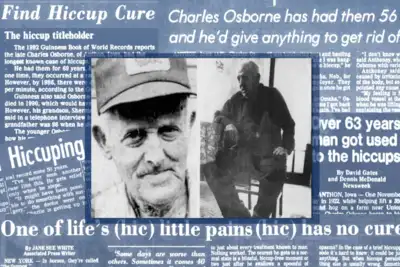ARTICLE AD BOX

Hiccups are usually harmless and occasionally show up in the form of an annoying distortion that most people deal with for a few minutes before they fade away. But in extremely rare cases, this common bodily reflex can become a chronic and debilitating issue.
Imagine having hiccups not for hours, days, or even weeks, but for decades. It seems nearly impossible, but it happened with Charles Osborne, who is famous for one of the most unusual medical cases ever recorded.Charles Osborne of Anthon, Iowa, began hiccuping on June 13, 1922, and continued almost nonstop for 68 years, a case officially recognized by Guinness World Records as the longest attack of hiccups ever recorded. His condition only stopped in 1990, a year before his death at age 97.According to People magazine in 1982, Osborne said the hiccups began after an accident while working on a farm in Union, Nebraska “I was hanging a 350-pound hog for butchering. I picked it up, and then I fell. I felt nothing, but the doctor said later that I busted a blood vessel the size of a pin in my brain.” The doctor, Terence Anthoney, believed Osborne’s fall damaged a small part of the brainstem that controls hiccups.
Osborne’s childhood acquaintance, Kevern Koskovich, recalled in an interview with Smithsonian Magazine that Osborne had a unique way of breathing to conceal the sound. “He’d flex his chest three or four times every minute. You could tell he was hiccupping, but he wouldn’t make any noise. He heaved, that’s the best way to describe it.” Osborne learned to suppress the noise by breathing between hiccups.
Despite consulting multiple doctors over the years, Osborne never found a cure.
The Argus Leader reported that Mayo Clinic doctors once briefly halted his hiccups using a mix of carbon monoxide and oxygen. However, the treatment was too dangerous to maintain.Dr. Ali Seifi, a neurosurgeon at the University of Texas Health Science Center, suggested another theory to Smithsonian Magazine that Osborne may have injured his ribs, which are connected to the diaphragm, the muscle responsible for hiccups.
Seifi believes diaphragm damage might explain the endless spasms. Another possibility, according to neurologist Diana Greene-Chandos in Prevention, is that Osborne suffered a stroke that triggered the hiccups.On average, Osborne experienced 20 to 40 hiccups per minute, which roughly estimates to 430 million hiccups over his lifetime. In rare cases, hiccups lasting more than a month are classified as intractable and can cause extreme fatigue and weight loss.
According to WebMD, such cases affect about 1 in 100,000 people and are often linked to nerve damage, central nervous system issues, or underlying conditions like cancer or diabetes.Osborne, however, endured it all with remarkable resilience. “He was a character,” Koskovich said to Smithsonian Magazine. “He didn’t talk about his condition much. He enjoyed joking with people and would greet them by saying, ‘What the hell’s going on?’”



.png)
.png)
.png)
















 2 days ago
6
2 days ago
6









 English (US) ·
English (US) ·